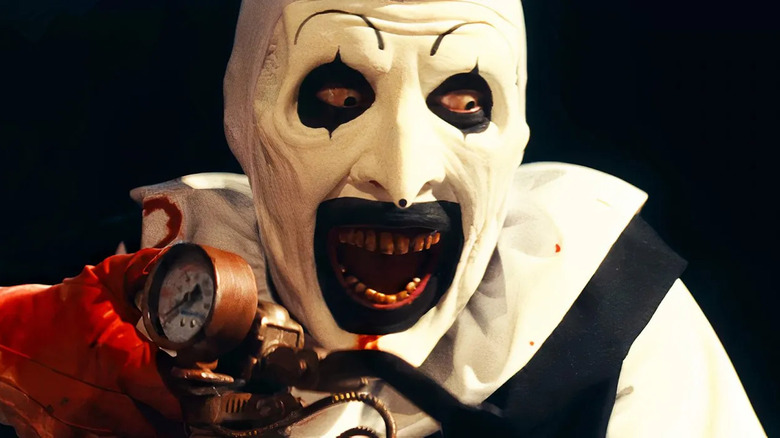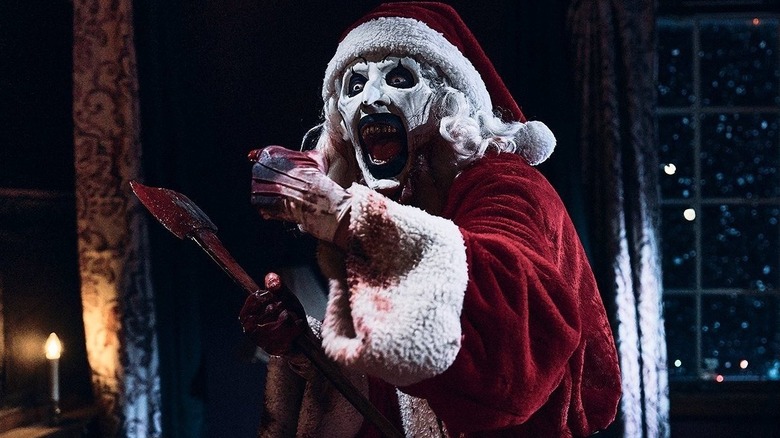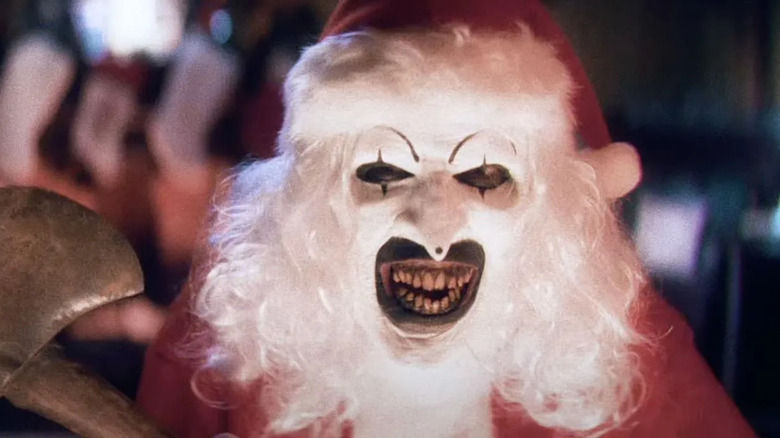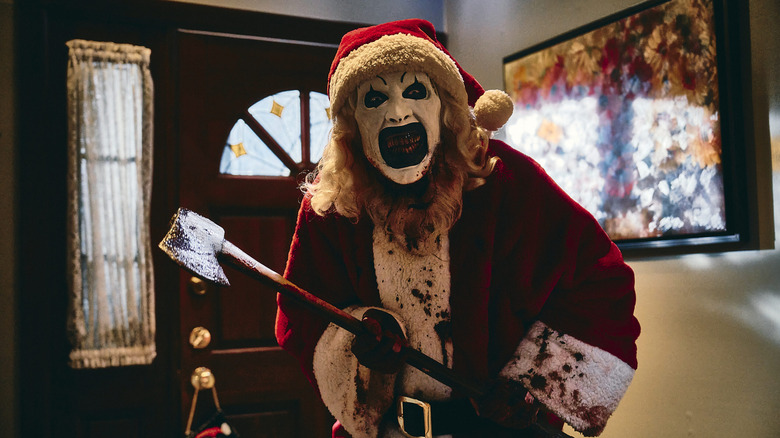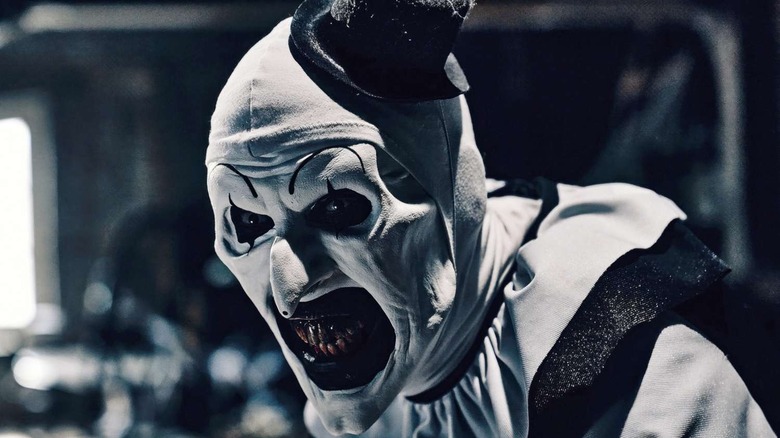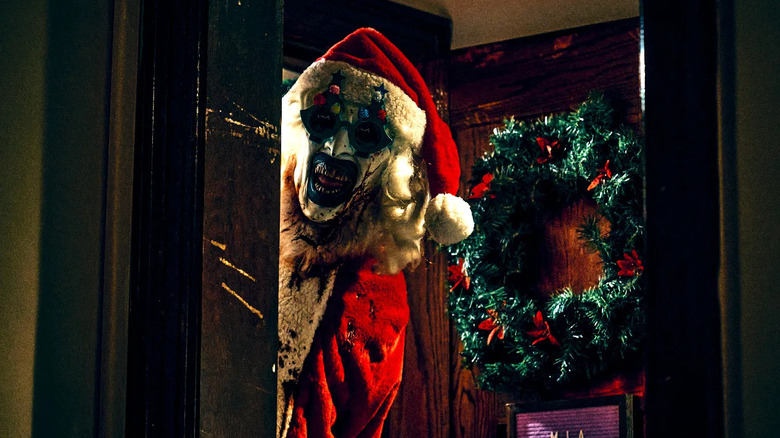The Maniacs Behind Terrifier 3 Have A Wild Idea For Horror Icon Michael Myers [Exclusive Interview]
It's hard to recommend the "Terrifier" films, seeing that they are the most violent, disgusting, and morally loathsome horror movies on the current cinematic landscape. But it's easy to warn people about them, and for the right breed of horror fan to take that warning as all the recommendation they need. God help me: I've become an Art the Clown fan, and each new entry in this ludicrously violent slasher series keeps finding new ways to test what I find acceptable in my entertainment.
"Terrifier 3" picks up the baton from its nasty, nightmarish predecessor and sprints with it. Like the surprise hit "Terrifier 2," the new movie is a nauseating experience where every death scene is masterclass in practical special effects wizardry. But also like the second movie, there's an eerie tinge of fantasy throughout the whole thing that makes it all feel like a weird dream to the viewer. There's something truly unique going on here, a blend of bad vibes and dark humor that somehow allows the nastiest moments to feel palatable. What is the demonic clown killer Art the Clown if not a modern slasher enacting our modern, deranged id like no one before?
I saw "Terrifier 3" at Fantastic Fest (and reviewed it here), but shortly before the screening, I was able to sit down with writer/director Damien Leone, Art the Clown actor David Howard Thornton, and professional wrestler Chris Jericho, who has a memorable role in the franchise. Because of the interview's timing, I was unable to ask much about "Terrifier 3," so instead, we talked about a little bit of everything else: the strange inspirations for Art the Clown's bizarre persona, the non-horror movies that influenced Leone, and which horror movies this bunch, who have seen their fair share, have enjoyed recently.
Oh, and they have one heck of a pitch for a new "Halloween" movie.
Note: This interview has been lightly edited for clarity and brevity.
Damien Leone is obsessed with movies, not just horror
The moment in the series that's left the biggest impression on me, and it's probably an obvious one, is the bedroom kill in "Terrifier 2" because it goes on, and on, and on.
Damien Leone: It does.
And I kept on thinking "This is not just a horror kill, this is somebody who has a Looney Tunes, Chuck Jones madman thing going on."
Damien Leone: Yes.
Other than horror, where do you draw your influences from? Is there a Looney Tunes background for you?
Damien Leone: Maybe for David. I certainly appreciate Looney Tunes, but that's not an inspiration for me when I'm writing these movies. But it's not just horror movies that inspire me. For instance, this one comes to mind: When Sienna is suiting up in "Terrifier 2" and putting on her armor, that's my homage to "Commando." That's one of my favorite scenes of all time, is Arnold getting suited up on the beach. I love '80s montages of people getting suited up to music. So it could be anything. There's influences from every genre, every decade of film in my movies. I'm obsessed with movies, not just horror.
Chris Jericho: I took my daughters to "Terrifier 2." We watch horror movies together. And that scene in particular, I thought it would freak them out, but they were like, "She would be so dead already. Doesn't even freak me out because she would just be dead. So that's okay." Just like you said: Just kept going, and going, and going.
David Howard Thornton: To answer your question about Looney Tunes. Yeah, definitely in my head, I kind of see Art as being the Bugs Bunny of the horror world in that way. He's that mischievous, chaotic character that — he even does drag. [laughs]
Damien Leone: So Bugs.
David Howard Thornton: [does perfect Bugs Bunny impression] "Yeah, ain't I a stinker."
My wife hasn't seen the films. She's a horror fan, but she has a hard time with gore sometimes.
Damien Leone: When's the divorce? [everyone laughs]
She's asked me, "Sell me on 'Terrifier 2.'" And I said, "Imagine if 'The NeverEnding Story' had a gory kill every 15 minutes."
Damien Leone: Oh, that's interesting.
Chris Jericho: One of my favorite movies, by the way.
Is there an intentional '80s fantasy vibe with these films?
Damien Leone: Huge. Big time. Especially, "Labyrinth," "NeverEnding Story." Those were two of my favorites, but more so was "Red Sonja." It's one of my favorite movies. One of the first movies I ever saw as a kid. So I grew up loving "Conan the Barbarian," "Conan the Destroyer," "Excalibur," and "Beastmaster." I loved them as much as I loved the slashers. So I did kind of marry those two genres and it was almost like a little experiment to see if they would work. Some people took to it more than others, but for me, I loved it. I loved incorporating that fantasy element.
This may be a Chris-specific question, but so many of the horror fans I know are also wrestling fans and vice versa. It's not even a Venn diagram, it's a circle. Can you explain me why people love both?
Chris Jericho: I would even throw heavy metal that too, rock and roll. Because when I was a kid, those were the three things I was into the most. And now that I'm still a big kid, it's still things that I love the most. I think because the element of when you see a horror movie that's — even back in the early days, they were batshit crazy. You're seeing stuff that you can't see anywhere else. You can't believe how much the boundaries have been pushed. I still remember seeing "Sleepaway Camp" for the first time, where Anvil's music, Canadian metal band, is at the beginning. Then the chick gets stuffed down an outhouse and dies. You can't die by getting stuffed down an outhouse, but I'm buying it. I just love the connection of that. And wrestling is very much an aggressive, energetic –
Damien Leone: Cathartic aggression.
Chris Jericho: Yes. They all are great characters. They have great rock and roll frontmen. Paul Stanley. David Lee Roth. That's just as good of a character as a great wrestling character or a great horror movie character. So there's a little bit of a fantasy element as a teenager where you have an outlet from all three of those things.
Here's how much of Art the Clown's actions are scripted
How much of Art is scripted versus David finding the physicality on the set? Because with no dialogue, the character is defined entirely through movements.
Damien Leone: I'd say it's about 50/50-ish.
David Howard Thornton: Yeah. 60/40?
Damien Leone: Yeah. For instance, I'll just give you an example because it's easier: The sunglasses scene in "Terrifier 2." So in the script, it'll say, "Sienna's up at the counter, Art the Clown goes over to the rack of sunglasses. He takes a pair of wacky sunglasses. Every time Sienna turns around, Art's in a new pair of sunglasses." But it's vague, right? So then what I'll do is I'll buy a whole box of wacky glasses, we put them on the rack, and then David just goes to town and he puts on these glasses.
Then for every style of sunglasses, he will just wring as much out of those as possible. There's even takes of him with the now-popular sunflower glasses of doing the peace sign and everything he could possibly do. And that's what we do a lot. So I have a very specific scene in the script of exactly what I want Art the Clown to do. We'll do my take, one or two takes, and then I let David go off. I let David just go off. And he'll improvise, and he'll do all these amazing things, and bring all these wonderful nuances to it. And then when I get to the editing room, I could basically mold the performance if I want him to be a little more Bugs Bunny, I'll lean more into that. If I want it to be more of just the cold, stoic, creepy killer, maybe we'll lean into the way I originally wanted it. So it's a perfect marriage between the two of us.
Chris Jericho: I think like you said too, just the fact that he doesn't say any words. The one that got me in "Terrifier 1," this character is really f***ing me up, is when you're on the tricycle, honking the horn. But it's not — everything that I do in wrestling, we play it straight. You could have made a big joke out of that, but it's not. You play it so straight. I'm just imagining if I'm locked in a dilapidated building, terrified for my life, some psycho clown is riding a tricycle honking his horn, that could push me to the edge of insanity. It was so terrifying.
David Howard Thornton: Also, speaking of the no talking, even though I don't have lines per se, I'm always making up my own dialogue in my head just so I have something to go off of, motivation-wise, and also beat-wise. Because especially when you're trying to do certain comedy bits, you have to have those certain beats that you have to hit there so the joke lands the right way. I'm constantly just making up my own dialogue and it helps me out a whole lot on set and everything. If people only heard the things I'm thinking in my head. [laughs]
You've done a lot of voice work in your career as well.
David Howard Thornton: That's the irony of this.
These two disciplines both require you use half your toolbox. Are those skills complementary?
David Howard Thornton: I've made it work for me. I think probably in between takes, that's when I'm doing my silly voices and stuff like that, too. But definitely one thing that was a definite challenge for me for playing Art was that was something I had to change about how I approach a character. Because beforehand, especially when I did a lot of my stage work, everything I would do when I first got the character so I can understand the character, I would try to find the character's voice. And it seemed like once I found how that character talked, everything else would fall into place — my posture, everything like that. And I didn't have that with Art. I was like, "Well, his voice is going to be his face and his body." So I was like, "Okay, well that's what I going to have to lead with. That's going to be what I'm going to be building his character off, is his physicality." It was a fun challenge to undertake, but now it's become so second nature to me after three films.
Damien Leone: And the underwear, finding Art's underwear. [laughs]
David Howard Thornton: Yes.
Damien Leone: We're still trying to find that, actually.
Art is 'the bastard child of Freddy Krueger and Harpo Marx'
Is there a silent clown you love? I feel like Art's too expressive to be Buster Keaton, but there's maybe a bit of Chaplin in there.
David Howard Thornton: Oh, definitely Chaplin. But really how I approached him, I looked at him as being the bastard child of Freddy Krueger and Harpo Marx.
Damien Leone: And Mr. Bean.
David Howard Thornton: And Mr. Bean. But there's a funny thing also, and this is something I realized just about a month or so ago because I decided to sit back when I had one night to myself, and I found a bunch of the old Marx Brothers movies on Amazon. And I was like, "I'm just going to watch these again." And I'm sitting there going, "What was Harpo Marx's real name?" And I looked it up. Arthur. He is Art. [laughs] This is something that was always there in the back of my brain. I looked at Harpo, he was known for his hat. He was known for his horn, just like Art.
The last time I spoke to Damien, our conversation was largely about creating gore. So I would love to hear how you direct your actors and how your actors take direction from you.
Damien Leone: Be careful, if you ever want to work with me again. [laughs]
Chris Jericho: The thing about Damien, he reminds me a lot of Kevin Smith in that he's a good f***ing guy. And basically, you are here for a reason. So what do you got? And there's no like, "Do this, this, this." [It's more like], "Do a scene or two. Try it like this, try it like that." I remember in "Terrifier 3," which you haven't seen yet, but there's a really crazy scene for my character, Burke, where he walks in the room and sees Victoria in this terrible grotesque [scenario]. And your horror movie brain is screaming. And he said, "Don't do it as a scream. Do it almost like ahhh."
Damien Leone: Like it took your breath away.
Chris Jericho: "Almost like you're in pain, got punched in the stomach and can hardly breathe." And it was so easy to do that. This is not what you would expect. This was more of a painful reaction, and I just thought it was such a great tip. So when you have a good relationship — like I said, my scenes with Damien were a day of shooting or two days, but you have a little connection. I'm sure you guys have a great connection. You trust each other. "What about this? Try that. Okay." That is what you want on set, is someone that you can go to. Damien is the captain of the ship. He's the f***ing boss. But if I have an idea, I'm not scared to throw it out there, because nine times out of 10 — we even improvised some dialogue that we used on one of my scenes. Just, "Yeah, go for it. Let's try it." So that's a good relationship to have. He's a very trusting director, which is great for the relationship and the performance.
David Howard Thornton: You pretty much nailed it. He's very actor-friendly, he's willing to hear new ideas and experiment. It's not just from the cast as well. You'll hear, if we have a crew member that has an idea for something, at the end of the day, the most important thing I think for us is to have the best movie possible. So he's open to hearing other ideas. Of course, he gets final say in everything. We've had so many happy accidents happen on set when things go wrong. He's very adaptive to whatever's happening. I remember in part two when it's a scene that we came up with basically out of the blue and it was a happy accident.
I was originally supposed to come smashing through this window to go after Allie and just chase her up the stairs. And when we got the window, it was already broken and it was the middle of night and we couldn't get a new window. And so Damien and a few of us just put our heads together. We had this little bit of a thing that we thought we were going to have halfway through it and we're like, "Well, why don't we just put that here and add more to it, where Art's just making himself at home and he's just getting a drink of water?" And I feel that's so much more creepy in that way. This guy is so confident in what he's about to do.
Chris Jericho: Also, just the fact that the mirror or the window was already broken, that was way scarier than if you came through it. Because imagine going downstairs, you're like, "Holy s***, there's something in here. I don't know what it is." It was a great scene.
David Howard Thornton: It was great. But that was one of those things, that he's so good at adapting to when things go wrong. He has got such a great mind to come up with new things, new concepts when push comes to shove. I always can count on him to come through at the very last moment if there's something wrong.
Damien Leone: Thank you, guys.
Especially, on the budget you're working on. If you aren't adaptable, you're f***ed.
Damien Leone: Oh, yeah. Well, I just want to be a safety net for the actors. Maybe they can't find something, and then they could always rely on me and come to me and say, "Well, how did you envision it?" Because I am the writer/director, so no matter what, I have a way that I picture all of this being said and delivered, but they're bringing a set of skills that I do not have to the table. I'm doing enough s*** on my own that I want things off my plate. So I don't want to get so involved with the actors. I want them to be so much better at acting. I want them to surprise me and make my words better.
Anything they could do to make it better. I always think whatever I write could be a thousand times better. So I want to be as collaborative as possible. But again, if they're not finding something, sure, I'll tell them what I'm thinking, how I think it should be played. But I'm open to so many suggestions. And I like trying many different options because then, again, I get into the editing room and then I have a spectrum of things I could choose from. And you can literally mold the performance in the editing room.
David Howard Thornton: I also want to brag about him, too. Not just how he is with the cast, but how he also is with the crew. He gets to know every single person on these sets, even down to our PAs that might be there just for a day or so. He gets to know every single person, welcomes them in. And I think that adds more to the collaborative nature of the film. Everybody feels safe to work together. We become like a family instead of just people just there for a paycheck. I think that's why we get a better product at the end of it, because everybody there is working together as a team, as a family. That would not be happening if we did not have a great captain behind the ship.
Chris Jericho: Well, it was cool too because I came in for two and then came in for three, two years later. And it's the same crew, same producers, same wardrobe. That's pretty rare. I'm sure there's a few, but for me, there's at least 10 people that I recognize from the last one. It's the same team. That's a good sign.
Damien Leone: We just had to bring in more people now.
David Howard Thornton: And they were welcomed right in. Just that first week on set with these new people, they already felt like family.
Why Christmas-themed horror movies resonate so well
David, how do you get yourself in the right mindset to play Art? How do you come down afterward? What's your process on that?
David Howard Thornton: I do my homework before I come. And especially after three films, I know who Art is. He's already just living in a part of my brain, so I can bring him on and turn him off whenever I have to. And I think that more comes from my stage days because I would sometimes play multiple characters in a show and sometimes I would have to argue with myself on stage. So I would have to be able to switch characters on the fly and turn them on, turn them off. And that's what I do with Art. I don't have to do any of the method acting stuff or anything like that, thank God. [laughs] I think everybody in the cast is very grateful for that. But it's also got to be a weird thing to see me, one second I'm on top of you stabbing you repeatedly with a knife and they say cut, and I'm like, "Oh, my God, are you okay?"
Damien Leone: This is Art the Clown on set. You say action, he pops up. Say cut, it's Dave the entire day. So very, very interesting.
This is a very open-ended question, so treat it how you care to. Why is Christmas horror the best horror? Because I think it is.
Damien Leone: Listen, that's one of my favorite sub-genres. And that's obviously, one of the main reasons I decided to take this into the Christmas world. The biggest Christmas inspiration, believe it or not, for "Terrifier 3" is the two "Tales from the Crypt" episodes. The Robert Zemeckis one from the '90s, which is a remake of the one from the Amicus [Productions] "Tales from the Crypt" from the '70s. And I think those are two of the most chilling, creepy Christmas shorts ever made. It's the epitome of creepy and cozy at the same time. It's just a feeling I absolutely loved as a kid. So I wanted to sort of take my crack at the maniac Santa Claus. Like the killer clown, it's a super cliche trope, but if you can find a way to make it fresh, then it becomes potentially magical. I was able to do something new and fresh, David and I, with Art, and now I was able to turn Art into a maniac Santa Claus, so that in turn makes Art fresh again. And it's a new spin on the maniac Santa Claus.
Chris Jericho: What I loved about it was the fact you took it out of the Halloween world. And when you first said that and told me about it, I was thinking I would've loved to have seen a Michael Myers in Christmas setting or Jason in Christmas. You couldn't do that. The franchise is called "Halloween." You have to make it Halloween. And by moving Art to Christmas, like you mentioned, it's a whole fresh new world, and that makes it exciting. If it was Halloween, it'd still be great, but this is a whole different mindset.
David Howard Thornton: I also feel it just opened up a whole new smorgasbord of things we can do with this character. He's in a whole new setting. And what I think also is interesting in Christmas horror movies in general, that it is always supposed to be such a sacred, safe, family-oriented time of the year. It's like everything's light, and happy, and fun. And you bring something just so sadistic and horrible into that. I think that just adds such a new layer of yuck. [laughs] You feel sacrilegious in so many ways. We definitely have a lot of sacrilegious stuff in this movie. We're probably going to get some hate from certain groups, but that's what I think makes it more fun in that way.
I too, one of my favorite subgenres of horror, especially slashers, are Christmas horror movies. So when he first came up with the idea, I think it's when we were even filming part two, he had that idea come up. And I'm like, "Oh my God, yes." I was so excited. "We have to, we have to. That's going to open up so many possibilities and put us also in a new subgenre." Because every year for Christmas, I know of so many horror fans that go and watch all those Christmas horror moves every year. It's a tradition. And I love that idea that we might be part of someone's Christmas tradition.
I'm already obsessed with Michael Myers at Christmas.
Chris Jericho: Right? How interesting would that be? We want to revive a franchise, go for that one.
Damien Leone: Just call it "Halloween Two Months Later."
Chris Jericho: Yeah, "Halloween Plus Two."
The horror movie ending that made Chris Jericho feel dirty
What's that horror movie you've seen in the past year or two that made you say, "This is the next level"?
Chris Jericho: I thought "Barbarian" was pretty good. I thought that was a great concept. And I love the fact that Justin Long was just such a scumbag who survives until the very end, and then they just ripped his face off. It was really, really surprising to me because like you said, it's hard to see movies, especially when you get into "Terrifier 3" and "Terrifier 2," that can shock you. And that one got me. Just the whole concept was really creepy when she made him suck his breast. Depravity where you cut my head off, fine. Make me suck your –
David Howard Thornton: But you felt sympathy towards that character. Not Justin Long, but –
Chris Jericho: You did! Because she was locked up.
David Howard Thornton: I was like, "Oh God."
Chris Jericho: Yeah. Made you think.
David Howard Thornton: I was like, "This poor thing." Now, unfortunately, I haven't seen the whole entire movie because I just haven't had a lot of time this past year to watch a lot of horror movies. But I did get to see "In a Violent Nature," the main kill that everybody talked about for that. And I was so happy with that kill. I was glad to see other filmmakers pushing the extremes with kills, especially with the creativity behind it, too. I was like, "Oh my God. I was like, 'Man, I wish we thought of that first.'"
Chris Jericho: The only thing I didn't like was is they showed the long shot of the cliff and it was a slope. Like, dude, that guy's coming? I'm rolling down the slope. I just stop, drop, and roll down the hill.
David Howard Thornton: But I love that imagery, which is fantastic. It had a great level of gore in there, too. I also enjoyed "The Menu." I used to work in the restaurant industry for 13 years. I totally identify with everything that's going on this movie. I thought it was fantastic.
Chris Jericho: Cheeseburger saves the day.
Damien Leone: Yes. And I'd throw "The Sadness" out there. I don't know if you've seen this one.
Oh, I have. Brutal.
Damien Leone: Brutal.
Chris Jericho: Really? I haven't seen that.
Damien Leone: Oh, dude. Brutal. Yeah. [It] definitely gives "Terrifier" a run for his money with the sadism in that movie.
Chris Jericho: Have you seen "Speak No Evil," the original, yet?
David Howard Thornton: No, I haven't actually.
Chris Jericho: You seen that?
I've seen both [the original and the remake]. They're both good.
Chris Jericho: I haven't seen the remake yet. I can't believe they would allow the ending from Europe to happen in the States.
It makes changes, but they do a good job with it. James McAvoy is fantastic in it.
Chris Jericho: The ending to the European one is one of the worst endings I've ever seen. It made me feel dirty. There you go. Check it out if you want to see something brutal.
Terrifier 2 is required viewing before seeing this sequel, but you can skip Terrifier 1
I'm glad you brought up "In a Violent Nature" because that and "Terrifier" are the exact opposite in terms of tone, but they show how malleable the slasher genre is. We're at a point where people can really get experimental with slasher movies again.
Damien Leone: Sure, absolutely. I'd never seen that sort of first-person, like a video game — I thought that concept was brilliant.
Chris Jericho: The ending to that was very interesting to me. It ends where you think, "Okay, something's going to happen." Not a spoiler, but nothing really does. You know what I mean? And I just thought that was such an interesting way to end it. There were some tropes thrown into it to where you think, "Okay, this is a typical story." And then it's not the typical story, which then pisses you off and then makes you start thinking about it. So I felt like you have to do something unique nowadays because we've seen 10,000 trillion slasher movies in every different scenario and genre. So it has to be unique. And when you can do that, that's when you can really excite us.
Damien Leone: Yeah. It does come down to the filmmaker's vision. If you could put a spin on it, you can make anything that's tired fresh again if you have something unique to bring to it.
For people who have not seen "Terrifier 1" or "2," are you good that they jump in with part three? Or is this the case where you should encourage them to go back and check out one and two?
Damien Leone: You could probably get away with not seeing "Terrifier 1," but I would highly recommend you see "Terrifier 2." I had the opportunity, after two was successful, to sit down with Hollywood studios because they were all interested in the formula. "What did you do? How did you do this with so little money to make this? Why are people liking this?" And some of them really wanted to make "Terrifier 3," but they wanted to sort of reboot it and kind of ignore what I did with part two and make it more accessible for a mainstream audience. And I just knew that was the wrong decision and I knew that we set up something special with part two and characters that are really important to this franchise, and we couldn't just neglect them and start over. There's bigger lore at play here and characters that I want to flesh out. So it is important that you see part two.
A friend of mine who regularly attends horror conventions talks about seeing Art the Clown tattoos everywhere. It's got to be gratifying to realize that people care enough about this that they're putting it on their bodies.
Damien Leone: Super gratifying. And it adds more, not a negative way, but it does add a little bit of pressure, because you see people — we were just at a con and no joke, I would say 15 at least, tattoos I saw there.
David Howard Thornton: That people showed us.
Damien Leone: Over two and a half days. These people, that's dedication. That means something really clicked with you if you want to put this on your body.
David Howard Thornton: They suffered for their Art. [laughs]
Damien Leone: So you don't want to let these people down. If you make a bad movie, that's going to leave a bad taste in their mouth when they've got this tattoo. But what it does is it makes us try so much harder, and put so much more into these movies, and put so much care into them. So we do. We're very conscious of fans.
"Terrifier 3" is in theaters now.
